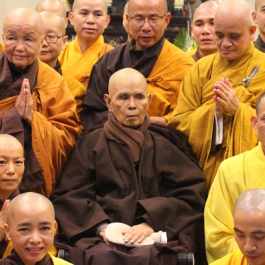
Splitting “singleness of mind” into the “Three States of Mind”
If we consider the mindset in the practice of Amitabha-recitation for rebirth in the Land of Bliss, we find that “singleness of mind” is explicitly emphasized in the Infinite Life Sutra and the Amitabha Sutra. This method of attaining rebirth is based on Amitabha’s 18th Vow, the Fundamental Vow of Deliverance.
The so-called Pure Land Path is an easy and simple, direct and straightforward way to attain rebirth with recourse to Amitabha’s 18th Vow, so it should be applicable to all sentient beings with different aptitudes and capacities—whether or not they are Buddhists.
However, in the Contemplation Sutra, Shakyamuni Buddha brings up the concept of the Three States of Mind. Here, the Three States of Mind are said to be the main cause for Buddhists, followers of Shakyamuni Buddha, to attain rebirth in the Land of Bliss. Actually, the Three States of Mind are identical with “singleness of mind,” as Master Shandao says. Indeed, the entire theme of the Contemplation Sutra is singleness of mind in dedication and aspiration for rebirth in the Pure Land.
When it comes to the mindset or cause of rebirth, why does Shakyamuni Buddha split “singleness of mind” into three in the Contemplation Sutra? It is because the Contemplation Sutra was delivered for Buddhists who already follow Shakyamuni’s teachings and practice the “self-powered” meditative and non-meditative virtues (the Sagely Path).
When those Buddhists wish to “switch: from the Sagely Path to the Pure Land Path in the pursuit of Buddhahood, they have to completely dedicate all the meditative and non-meditative virtues attained through their self-powered practices in the past and present, and single-mindedly aspire to be reborn in Amitabha’s Pure Land through the exclusive practice of Amitabha-recitation. This is the meaning of “singleness of mind in dedication and aspiration for rebirth in the Pure Land.”
Why is it necessary for those who aspire to be reborn in Amitabha’s Pure Land to have singleness of mind in dedication and aspiration for rebirth? Master Shandao explains in a verse in his In Praise of Dharma Practices:
The Land of Bliss is a realm of unconditioned nirvana;
It’s hard to be reborn there by practicing assorted virtues according to circumstances.
The Tathagata selects the key method—
He teaches us to recite Amitabha’s name with two-fold exclusivity.
The Land of Bliss is Amitabha’s homeland; it is a “reward land,” a realm of unconditioned nirvana (in other words, no-birth and no-death). It is adorned with Amitabha’s unsurpassed and splendid real merits and virtues. The assorted unreal virtues attained by all other sentient beings through “self-powered” practices according to circumstances are incompatible with Amitabha’s. Thus, we are advised to dedicate all these unreal virtues once we aspire to be reborn in the real Land of Bliss. Actually, this is a description of the Sincere Mind, the first of the Three States of Mind.
To settle our mind of aspiration with recourse to Amitabha’s Fundamental Vow of deliverance
Although the Three States of Mind are taught by Shakyamuni Buddha in the Contemplation Sutra, it does not mean there are actually three separate and independent mental states. The three are merely describing “singleness of mind” from three different angles. All of them are actually the single mind of reliance on Amitabha’s vow power and aspiration to rebirth in his Pure Land.
In the explication of the Three States of Mind, Master Shandao stresses the genuine nature of practitioner’s faith and aspiration for rebirth as he elucidates the Sincere Mind. Next, he refers to the Deep Mind to highlight the unwavering character of such faith and aspiration.
To achieve anything, our minds must first be genuine, not false. So, we speak first of the Sincere Mind—to admit and confess the fact that our minds are delusive, and our thinking is, by nature, ever-changing. Because of this, our actions cannot naturally correspond to our thinking.
However, if we rely on Amitabha Buddha’s accomplished vows and recite his Name, we will naturally receive the real merits of his Name through his merit-dedication to us. It is because Amitabha practices in his causal ground with a genuine mind that he attains real merits, which are the same merits we attain if we practice in accord with his Fundamental Vow.
When we aspire to rebirth in the Land of Bliss, we must settle our minds of aspiration on Amitabha’s Fundamental Vow of deliverance, rather than on our own wavering belief and the ever-changing inclinations of our delusive minds. According to Master Shandao, this is what is meant by the “Sincere Mind.”
Once our settled mind is “tuned” in this way, it is as indestructible as a diamond. At this stage, we have to move to the second State of Mind: the Deep Mind. Essentially, the Deep Mind is an underlying resolve that if other people confuse and challenge us, we can stand firm so as to reach our ultimate goal. But how is this genuine and resolute mind established? This issue is taken up on the section on the Mind of Merit-Dedication and Aspiration.











